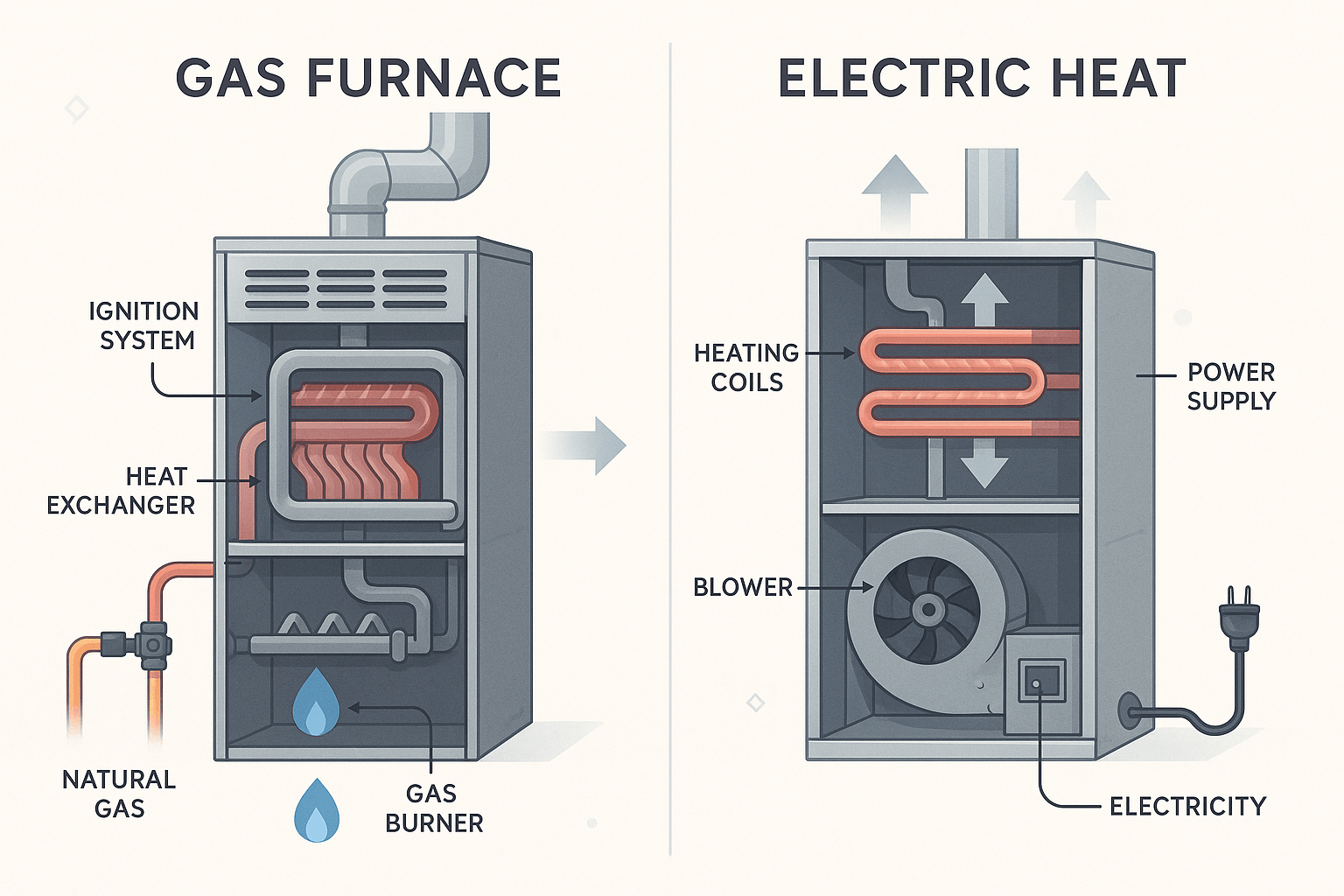Choosing between a gas furnace and electric heat influences your comfort, energy bills, and maintenance. A gas vs electric furnace install comes with different strengths and trade-offs in installation, efficiency, and ongoing costs. The right decision depends on your property setup, available utilities, and budget.
Understanding Furnace Types: Gas Furnaces and Electric Heat
Gas furnaces burn natural gas to heat a metal exchanger, with a blower distributing warm air through ducts. Electric furnaces use resistive heating elements powered by electricity, producing heat without combustion.
What this means for you:
-
Heat output: Gas furnaces provide faster, higher-intensity heat, which is beneficial in colder climates.
-
Simplicity: Electric furnaces have fewer moving parts and require no flue or venting.
-
Utilities: If a gas line is already present, gas can be a practical choice. Without gas access, electric heating avoids additional infrastructure work.
-
Maintenance: Electric units often require fewer repairs; gas systems must be checked regularly for burner and safety performance.

Factors to Consider When Selecting the Right System for Your Home
When deciding between gas and electric heating, several factors can guide you toward the best fit for your property. Each option has unique requirements, costs, and long-term implications, so it helps to weigh them carefully.
Your current setup
-
Homes with a gas connection often benefit from a gas furnace.
-
All-electric homes may prefer an electric furnace to avoid gas line installation.
Operating costs
-
Gas is usually cheaper per unit of heat, lowering winter bills in many regions.
-
Electric furnaces achieve near-total energy conversion but can be costlier to run where electricity is expensive.
Installation and disruption
-
Electric furnaces typically need an adequate electrical supply and breaker.
-
Gas furnaces require gas piping, venting, and compliance with local safety codes.
Lifespan and service
-
Electric models often last longer with quieter operation.
-
Gas units remain reliable with regular professional servicing.
Safety and preferences
-
Gas combustion requires carbon monoxide monitoring and safe venting.
-
Electric systems remove fuel-burning concerns.
Taking these considerations into account helps clarify which system will deliver the right balance of comfort, cost, and practicality for your home.
Installation Differences: Comparing Electric Heat and Gas Furnace Processes
Although both types of furnaces heat your home effectively, the installation process differs in complexity, requirements, and time involved. Understanding these distinctions helps homeowners prepare for potential costs, adjustments to their property, and the level of work required by a professional installer.
Electric furnace installation
-
Requires only electrical connections and ductwork adjustments
-
No venting needed, often simpler and quicker
Gas furnace installation
-
Requires a safe gas line connection and code-compliant venting
-
Commissioning includes burner tuning and safety verification
Energy Efficiency: How Each Furnace Impacts Your Monthly Costs
Heating is one of the largest contributors to energy use in most homes, so the type of furnace you choose will have a noticeable impact on monthly expenses. Gas and electric furnaces operate in different ways, and those differences are reflected in both efficiency and cost. Gas furnaces generally deliver heat faster and can be more affordable to run where natural gas rates are favorable.
Electric furnaces, meanwhile, convert nearly all the power they use directly into heat, meaning they waste very little energy. However, their operating costs depend heavily on local electricity prices, which can make them more expensive to run in cold climates or larger homes. Other factors, including home size, insulation quality, and the age of the equipment, also play a part in overall energy efficiency.
Understanding how each system performs helps you estimate long-term bills and choose the most cost-effective option for your circumstances.
-
Gas furnace: Delivers quick warmth and may lower heating bills where natural gas is affordable. High-efficiency models make better use of fuel.
-
Electric furnace: Converts nearly all electricity into heat at the point of use. Where electricity rates are high, operating costs may exceed gas, particularly in larger homes or during extended cold periods.
Looking at energy efficiency from both a performance and cost perspective gives homeowners a clearer view of the trade-offs and can make comparisons between gas and electric systems more straightforward.
Pros and Cons of Gas Furnaces and Electric Heat
Comparing pros and cons is one of the clearest ways to understand whether a gas or electric furnace will meet your needs. Each system has strengths that suit certain households, along with drawbacks that may make them less practical in others. Reviewing both sides helps balance performance, cost, and convenience before making a decision.
Gas furnaces pros
-
Strong heating performance in very cold weather
-
Often lower fuel costs where natural gas is available
-
High efficiency models widely available
Gas furnaces cons
-
More complex installation with venting and gas piping
-
Requires regular inspections and tune ups
-
More components can mean higher repair frequency
Electric furnaces pros
-
Easier to install with no flue or venting
-
Quieter operation and typically fewer repairs
-
Good choice for homes without gas service
Electric furnaces cons
-
Higher running costs in regions with expensive electricity
-
Warm up may feel slower in extremely cold weather
Looking at these pros and cons side by side provides a straightforward comparison of how each type of furnace performs. This approach makes it easier to weigh immediate installation needs against long term operating costs and maintenance requirements.
Making the Right Choice
Choosing between a gas or electric furnace comes down to your specific needs, budget, and home setup. Both options offer unique advantages and potential savings, so it’s important to consider what matters most for your household. If you need expert advice or seamless furnace installation in Lemoyne, PA, trust the team at Leaps & Bounds for straightforward guidance and reliable service. Reach out today and find the perfect heating solution that fits your comfort and energy goals.


